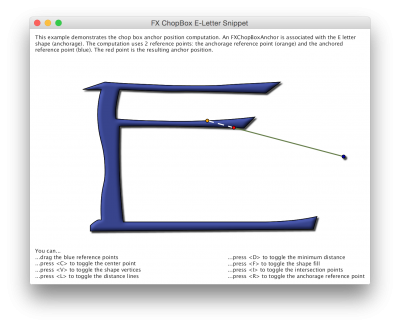Notice: this Wiki will be going read only early in 2024 and edits will no longer be possible. Please see: https://gitlab.eclipse.org/eclipsefdn/helpdesk/-/wikis/Wiki-shutdown-plan for the plan.
GEF/GEF4/FX/Examples
Examples (undeployed)
- bundle: org.eclipse.gef4.fx.examples
The examples provided by Examples demonstrate how to use the API provided by the FX module of GEF4 FX. They are not deployed on our update-sites and have to checked out in source (org.eclipse.gef4.fx.examples) from our GEF4 Git repository. In order to have the example plug-in compile properly, all other required GEF4 bundles will either have to be installed (in a matching version) into your running eclipse platform (if this is used as target), added to a target definition (the target definitions contained in org.eclipse.gef4.target may be augmented for this purpose), or checked out in source as well. You will also have to install e(fx)clipse in your running eclipse instance and target platform (see GEF Project Contributor Guide for details on how to obtain the sources and setup your workspace). Having prepared everything as outlined before, the standalone example might easily be started by launching one of the following example classes from org.eclipse.gef4.fx.examples via the context menu ('Run As' -> 'Java Application').
FXChopBoxELetterSnippet
The FXChopBoxELetterSnippet demonstrates usage of FXGeometryNode and visualizes the reference point computation for the FXChopBoxAnchor.
Examples.UI (undeployed)
- bundle: org.eclipse.gef4.fx.examples.ui
The examples provided by Examples.UI demonstrate how to use the API provided by the FX.UI module of GEF4 FX. They are not deployed on our update-sites and have to checked out in source (org.eclipse.gef4.fx.examples.ui) from our GEF4 Git repository. In order to have the example plug-in compile properly, all other required GEF4 bundles will either have to be installed (in a matching version) into your running eclipse platform (if this is used as target), added to a target definition (the target definitions contained in org.eclipse.gef4.target may be augmented for this purpose), or checked out in source as well. You will also have to install e(fx)clipse in your running eclipse instance and target platform (see GEF Project Contributor Guide for details on how to obtain the sources and setup your workspace). Having prepared everything as outlined before, the standalone example might easily be started by launching one of the following example classes from org.eclipse.gef4.fx.examples.ui via the context menu ('Run As' -> 'Java Application').

